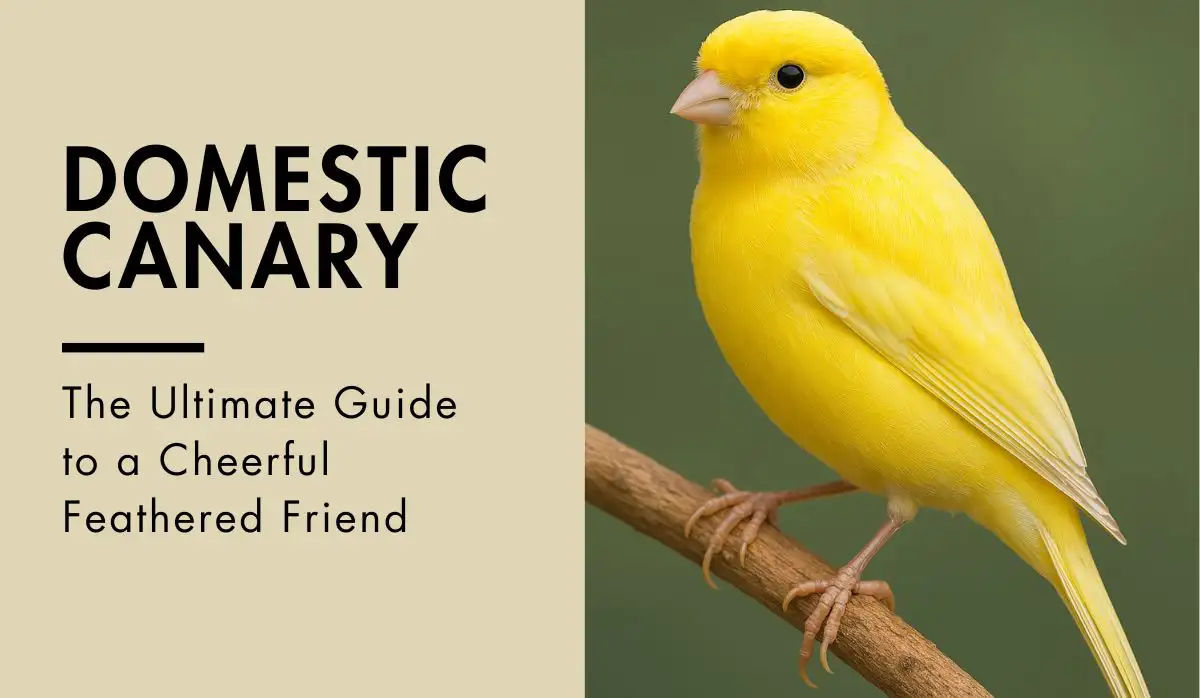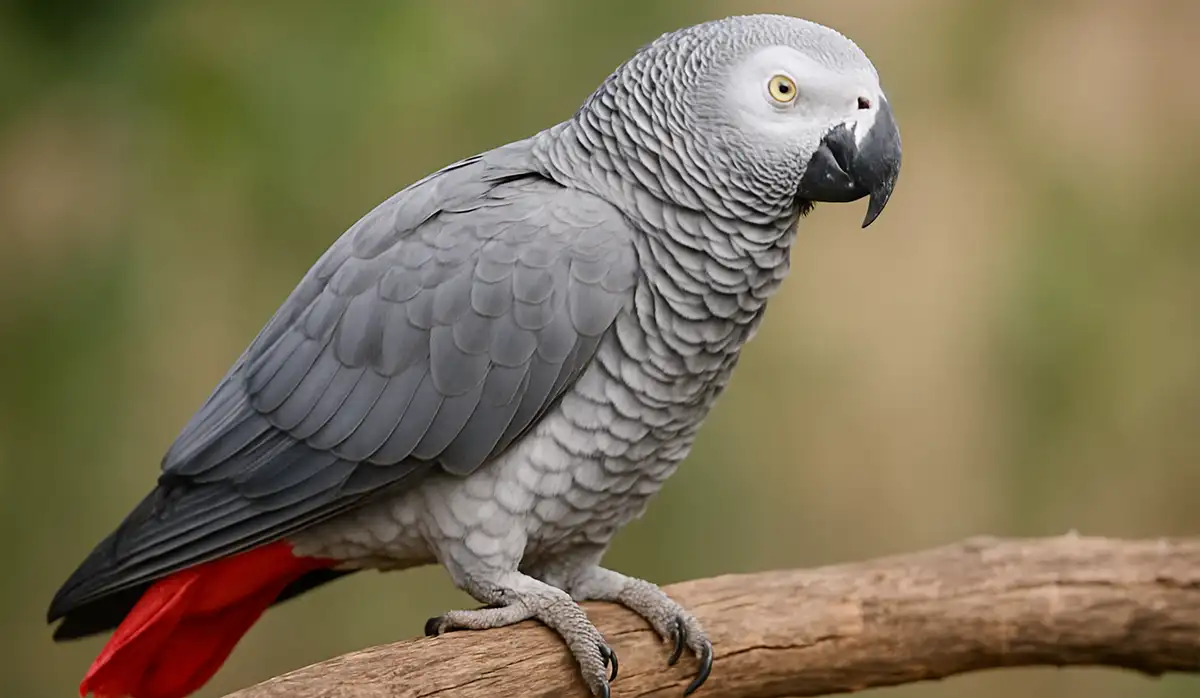Domestic Canary: The Ultimate Guide to a Cheerful Feathered Friend
By Pet Luvz on April 8, 2025

Introduction to Domestic Canary
So, you’re curious about the domestic canary? Trust me, you’re not alone. These cheerful little birds have been stealing hearts with their melodies and vibrant colors for centuries. Whether you’re considering getting one or just fascinated by them, this guide covers everything you need to know about these delightful companions.
Table of Contents
What is a Domestic Canary?
A domestic canary (Serinus canaria domestica) is a small songbird originally derived from wild canaries native to the Canary Islands, Azores, and Madeira. Learn more from Wikipedia’s Canary Page.
A Brief History of the Domestic Canary
Brought to Europe by Spanish sailors in the 15th century, canaries quickly became symbols of luxury and song. Their popularity spread, and today they remain beloved pet birds. Here’s a fascinating history of domestic canaries.
Physical Characteristics of Domestic Canaries
Size and Shape
These tiny songbirds typically grow around 4.7 to 5.5 inches long. Their slender bodies and short, rounded wings make them graceful and agile.
Color Variations
Canaries have been selectively bred into dozens of color mutations. Discover a variety of canary colors and genetics on Beauty of Birds.
Sexual Dimorphism
Males are generally more vocal. Want to know how to tell a male from a female? AvianWeb has a great guide.
Popular Breeds of Domestic Canaries
Song Canaries
- Waterslager: Their water-like song is truly unique. Hear a clip on YouTube.
Color Canaries
Popular for their vivid reds and oranges, red factor canaries require a special diet to maintain their color. Learn more from The Spruce Pets.
Type Canaries
With distinct body shapes and feather styles, breeds like the Gloster and Frill canaries are absolute show-stoppers. Check them out here.
Choosing the Right Canary for Your Home
Temperament and Behavior
Canaries are calm, quiet, and relatively low-maintenance. They don’t demand attention like parrots but still enjoy your presence.
Compatibility with Other Pets
If you’d like to learn about bird-safe pet pairings, check PetMD’s guide on pet compatibility.
Cost and Availability
Depending on the breed, prices vary. Specialty breeders often have unique types available online. You can find canaries listed on trusted bird marketplaces like BirdBreeders.com.
Housing and Cage Requirements
Cage Size and Material
The minimum size should be 18×24 inches. Stainless steel cages are best to avoid rust or toxicity. Read more about ideal cages here.
Cage Placement and Environment
Avoid drafts and direct sunlight. Canaries thrive with a steady light-dark cycle to regulate their hormones and behavior. Learn how lighting affects birds from VCA Animal Hospitals.
Essential Accessories
You’ll need:
- Perches of varied textures
- Food and water containers
- A birdbath
Petco has most of these in stock.
Feeding Your Domestic Canary
Best Diet for Optimal Health
Canaries need more than just seeds. A well-rounded diet includes:
- High-quality seeds or pellets
- Fresh veggies and fruits
- Egg food occasionally
Here’s a complete canary diet guide.
Foods to Avoid
Never feed chocolate, avocado, or alcohol—these are toxic. ASPCA has a complete list.
Health and Wellness
Common Health Issues
Canaries are prone to:
- Mites
- Respiratory illness
- Egg binding
PetCoach offers expert advice on bird health.
Signs of Illness
If they look fluffed up, stop singing, or have odd droppings, get them checked ASAP.
Preventive Care Tips
Routine cage cleaning and fresh food can go a long way in preventing illness. Check these prevention tips from Avian Medicine.
Grooming and Hygiene
Bathing Routine
Offer a shallow dish or spray gently. It helps with feather maintenance and keeps them happy.
Nail and Beak Maintenance
Use natural wood perches to keep nails and beaks from overgrowing. If trimming is needed, consult a vet or watch a safe demo here.
Cage Cleaning Tips
Clean thoroughly at least once a week. Disinfect with bird-safe products like Poop-Off Bird Cage Cleaner.
Breeding Domestic Canaries
Breeding Conditions
They need longer daylight hours and a stress-free environment. Check this complete breeding guide.
Nesting and Egg Care
Use nesting cups and soft material. You can find nesting supplies on BirdSupplyNH.
Caring for Chicks
Supplement parents’ food with protein-rich egg food. Make sure the chicks are growing at a healthy pace.
Canaries and Their Songs
How to Encourage Singing
Keep them happy and healthy. Some owners use canary song CDs to stimulate singing behavior.
Quiet vs. Vocal Birds
Some breeds sing louder or more frequently. Don’t be alarmed if your female doesn’t sing much—it’s completely normal.
Training and Taming Your Canary
Building Trust
Talk to them gently and move slowly. Over time, they’ll become familiar and less skittish.
Basic Training Tips
Offer treats like millet by hand.
Socialization Techniques
Let them hear daily sounds—TV, music, soft conversation—to help them adjust to your home life.
Traveling with a Canary
Transport Tips
Use a secure travel cage. MidWest Bird Carrier is a good option for short trips.
Stress Management
Speak softly, avoid loud music, and keep the cage partially covered.
Travel Essentials
Bring fresh water, food, and a small perch. Keep the trip as brief as possible.
Understanding Canary Behavior
Communication Signs
Chirping, wing-fluttering, or head bobbing usually shows excitement or curiosity.
Stress Indicators
If your bird plucks feathers or goes quiet, something might be wrong. Read behavioral warning signs here.
Behavioral Problems and Solutions
Rearranging the cage or rotating toys helps.
The Lifespan of a Domestic Canary
Average Lifespan
They live around 10–15 years with good care. Learn more about lifespan factors from Animal-World.
Tips to Extend Lifespan
- Fresh food
- Vet check-ups
- Clean living space
- Enrichment
When It’s Time to Say Goodbye
End-of-life care matters too. Offer peace and dignity.
Conclusion: The Joy of Owning a Domestic Canary
They fill your home with song and bring a splash of color to your daily life. They’re low-maintenance, friendly, and perfect for small homes or apartments. With the right care, you’ll enjoy years of companionship from this cheerful little bird.
For more pet care tips, visit PetLuvz.
FAQs
1. Are domestic canaries good pets for beginners?
Yes, they’re ideal for first-time bird owners due to their simple care routine and calm nature.
2. Can canaries be kept with other birds?
They can co-exist in aviaries but prefer solitude. Avoid caging them with aggressive species.
4. Do female canaries sing?
Rarely. Most of the singing is done by males, especially during mating season.
5. How do I know if my canary is happy?
Singing, hopping, preening, and active behavior are all signs of a happy canary.
YOU MAY ALSO LIKE
Top Pick
-

7 Proven Benefits of Fresh Pet Dog Food for Daily Health
January 11, 2026
-

African Grey Parrot: A Smart, Loving, and Talkative Companion
July 22, 2025
-

5 Best Canister Filters for Crystal Clear Water in Your Pet Fish Tank
July 8, 2025
-

Is Pumpkin Good for Cats? Everything You Need to Know
July 5, 2025
-

Swim Bladder Treatment: Solutions for Aquarium Fish Health
July 3, 2025











